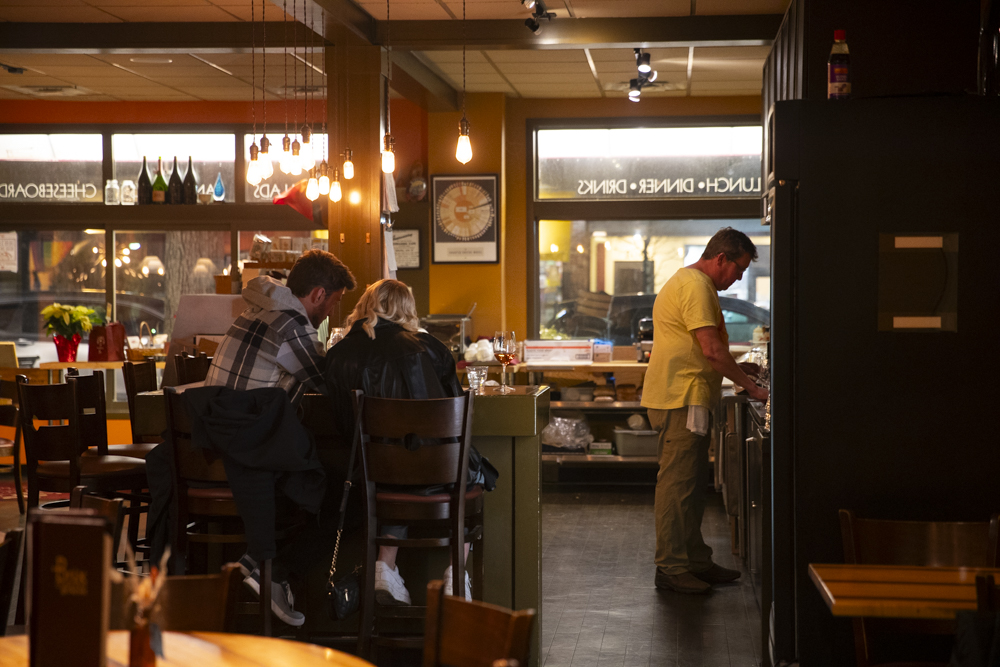When University of Iowa alum Emma Bohn took a job at Brix Cheese Shop and Wine Bar in Iowa City during her third year at the university, the political science major never anticipated the path it led her down.
Bohn held up a broken finger, having just finished working nearly two and a half months at Raptor Ridge Winery in Portland, Oregon, where she and her team often worked from 7 a.m. to 11 p.m. harvesting and processing grapes for wine production.
The work took a toll on Bohn’s body. Her hands turned a purple blend of wine stains and bruises as she spent hours watching fruit pound a MacroBin lid, sustaining herself on only beef jerky and a deep appreciation for the work devoted to wine production.
“It is, more than anything, a labor of love,” Bohn said. “My literal blood, sweat, and tears went into that wine.”
Bohn started working at Brix in March of 2021. With no serving experience and a noticeable age gap between her and the rest of the small staff, she felt a little intimidated. However, Bohn quickly came to know her coworkers as kind, mellow, and knowledgeable.
“I was really lucky to be a young person being able to scoop up all that knowledge,” Bohn said. “They laid it out for me and made [wine], something that can be so scary and overwhelming and pretentious, so low stakes, fun and approachable.”
As a flyover state, Iowa is not widely known for its cultural enrichment and seems an unlikely home for sommeliers. However, wine enthusiasts in Iowa City are eager to dispel the idea that studying wine is a snob trade.
Recently, one Iowa City northside restaurant, the Webster, appeared on The New York Times’ 2023 Restaurant List.
While it may seem odd that such a haute establishment exists in Iowa, Webster’s co-owner Riene Gelman said she believes there is a place for elevated dining in the Iowa City community.
“A lot of people who are born and bred Iowa City residents want something new and different,” Gelman said. “It’s a breath of fresh air.”
When curating the wine list for the Webster, Gelman has always been careful to select a variety of wines that would appeal to different palettes. She tries to keep the selections young and fun while also taking cost into consideration.
“Having a wine list that does have different wines or different price points appeals to younger kids where it doesn’t come off as intimidating,” Gelman said.
Gelman’s wine knowledge came from 20 years of working in front-of-house positions as well as in service and wine. Despite her experience, Gelman does not have the title of sommelier and said she felt no need to pursue it.
“To me, [sommelier certification] might have some people take me more seriously, but I think taking it too seriously takes a lot of the fun out of it,” Gelman said.
Like Gelman, Bohn appreciates the title of sommelier but understands wine is not just for people with specialized knowledge.
“My favorite thing about wine is sharing it with people, people who know a lot, [and] people who know nothing at all — making it a communal thing,” Bohn said.
Deb Coppage has been dubbed Bread Garden Market’s “wine mom” by her young customers who approach her for guidance.
“Don’t read the tasting notes,” Coppage tells beginner wine tasters. “Close your eyes and tell me what it reminds you of, and use your own adjective.”
Coppage began working with wine in 2000 after her ex-sister-in-law invited her to help make wine in her garage in Berkeley, California.
Coppage has flown out to California for each harvest season since. She helped begin the Four Wines Vineyard before selling it in 2018, then helped establish Cypher Winery in Paso Robles.
At Bread Garden, Coppage helps customers find what they like in a wine. She explained she wants to cultivate an appreciation in others, not turn them into sommeliers.
“We don’t need any more wine snobs in the world,” Coppage joked.
Coppage recalled how when visiting Paso Robles, California, locals often ask her if she enjoys leaving Iowa to experience culture. This comment has always made her laugh; she affirmed it’s quite the opposite.
In Coppage’s opinion, Paso Robles — a town known for its agriculture — is much less culturally diverse than Iowa City.
“We have literature, we have arts — we have all this multicultural diversity in this strange little pocket in Iowa City,” Coppage said.
Iowa City’s wine scene, while not well-known, exists because it invites people to try new things and fosters community. Good wine exists in Iowa, and everyone is invited to enjoy it.



